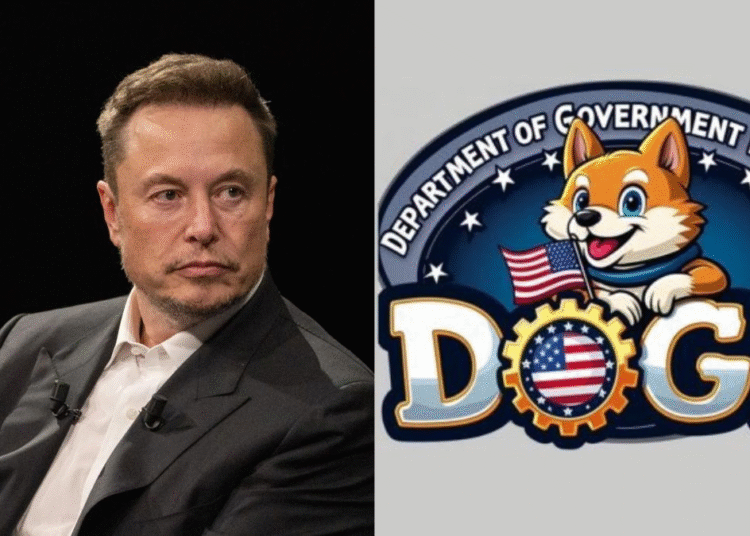Elon Musk’s DOGE budget cuts have sparked considerable debate, with critics like Steve Bannon questioning the transparency and effectiveness of this ambitious initiative. Originally promising to slash a whopping $2 trillion from the federal budget, Musk’s projections dwindled dramatically to just $150 billion, and now it appears to be effectively nothing, leaving many baffled. Bannon has openly criticized the supposed savings touted by the DOGE government efficiency project, calling for a detailed DOGE savings analysis to clarify clear financial outcomes. The controversial cuts, which were supposed to exemplify Musk’s financial plans for reduced waste in federal spending, have instead raised eyebrows about the level of government efficiency achieved. As the conversation surrounding budget cuts transparency continues, many are left wondering whether real change is on the horizon or just empty promises.
The recent controversy surrounding Elon Musk’s financial adjustments within the DOGE initiative has caught widespread attention, particularly given its dramatic fiscal promises. Initially targeting massive savings that plummeted from trillions to negligible figures, the project has raised significant skepticism. Critics, including influential figures like Steve Bannon, are calling for clarity about the actual efficiency results derived from this government efficiency project. The ongoing discourse reflects deeper concerns about the robustness of expenditure cuts and budgetary management in today’s government. In this context, the dialogue around Musk’s endeavor has become emblematic of broader issues of accountability and fiscal responsibility in federal operations.
Elon Musk’s DOGE Budget Cuts: A Shift from Promises to Reality
Elon Musk’s ambitious plan to cut $2 trillion from the federal budget has faced severe scrutiny as the figures have gradually dwindled to nearly nothing. Initially, Musk’s proposals seemed revolutionary, promising vast savings that would reshape governmental fiscal policies. However, as critiques surfaced from notable figures like Steve Bannon, the reality of these budget cuts has come under fire. Bannon noted that the anticipated reductions have plummeted to a mere $150 billion and are now effectively nonexistent, leading to questions about the accountability and feasibility of such sweeping financial measures.
As the former chief strategist to President Trump, Bannon’s insights carry weight within political spheres, emphasizing the lack of transparency surrounding Musk’s Department of Government Efficiency project. The projected results of DOGE, initially painted as a beacon of financial prudence, have morphed into a source of confusion. The inconsistency in figures suggests a deeper issue, perhaps one of mismanagement or illusion rather than genuine reform.
Examining the DOGE Savings Analysis: Real or Fictional?
A recent report from The Atlantic has dissected the claims surrounding DOGE’s budget savings, presenting a stark contrast to Musk’s earlier assertions. The analysis revealed that the verified savings amounted to just $2 billion, grossly undercutting the agency’s earlier claims of up to $165 billion. This revelation poses significant implications for fiscal responsibility within governmental projects, particularly those as publicized as DOGE. Critics like Bannon highlight the inconsistencies in reported figures, indicating potential instances of double-counting and misleading accounting practices.
Moreover, the focus should not merely be on numerical discrepancies, but the overall effectiveness and integrity of the governmental efficiency project itself. Musk’s acknowledgment of the dire state of federal bureaucracy sheds light on the systemic challenges that go beyond mere dollar amounts. His candid admission reflects a need for reevaluation, suggesting that a shift in approach may be required to achieve meaningful reductions in government waste, rather than simply manipulating data to fit an agenda.
Steve Bannon’s Stance: A Call for Budget Cuts Transparency
Steve Bannon’s critique extends beyond mere skepticism—it embodies a call for clarity and transparency in budgetary practices associated with government efficiency initiatives. He asserts that the lack of ‘specific accounting’ for the savings claimed under the DOGE project raises serious ethical concerns. For Bannon, the request for detailed documentation and certification from various government entities underscores his belief that without transparency, public trust in governmental processes diminishes. He demands that all financial activities be openly scrutinized to ensure that taxpayer dollars are being managed effectively.
Bannon’s insistence on accountability aligns with a broader push for fiscal reform in governance. By advocating for a model where savings are verifiable and processes transparent, he seeks to foster a culture of responsibility among government officials, especially in initiatives spearheaded by high-profile figures such as Musk. Such accountability measures could potentially restore public confidence, making government efficiency efforts more effective and less prone to political manipulation.
The Need for Government Efficiency Projects Beyond DOGE
The challenges encountered with the DOGE program signal a pressing need for competent government efficiency projects that can deliver on their promises. As Bannon highlighted, the current condition of federal bureaucracy is fraught with issues that hinder genuine reform. The inadequacies of DOGE exemplify a broader systemic problem that necessitates rigorous strategies focused on accountability and sustainable financial management. This includes prioritizing genuine restructuring of processes rather than superficial budget cuts as evident from Musk’s controversial tenure.
Developing effective government efficiency projects requires strategic planning and implementation that genuinely addresses wasteful spending. The lessons learned from the DOGE initiative showcase the importance of establishing robust mechanisms for oversight and evaluation within federal programs. By learning from past failures, future projects can prioritize transparency and authentic cost reductions, ultimately leading to a more efficient government capable of serving the needs of its citizens.
Musk Financial Plans: Vision or Miscalculation?
Elon Musk’s financial strategies have always drawn attention for their ambitious scope and bold projections. His vision for reengineering governmental efficiency remains a point of contention, especially in light of recent budget cuts and criticisms from figures like Bannon. While Musk’s grand vision could foster significant reformation within federal spending practices, the tangible outcomes of his financial planning raise questions about feasibility. The gap between Musk’s ambitious forecasts and reality has led critics to question whether he possesses the necessary understanding of government financial intricacies or if he has underestimated the complexities involved.
As Musk grapples with the fallout from the DOGE project, the future of his financial plans hangs in balance. Stakeholders are beginning to call for a more grounded approach that combines vision with rigorous execution and accountability. The perception of Musk’s financial strategies as potentially superficial or overly optimistic could undermine support for innovative solutions in governmental budgeting. Moving forward, it’s imperative for leaders not only to present bold ideas but to ensure that their execution aligns with practical, achievable outcomes.
The Impact of Musk’s DOGE Cuts on Public Trust in Government
Public trust in government is highly susceptible to fluctuations, especially when high-profile initiatives like Musk’s DOGE project iterate both ambitious savings and underwhelming results. As allegations of exaggerated savings and financial mismanagement emerge, they foster skepticism among the public. Bannon’s commentary on the diminishing credibility of DOGE exemplifies concerns that arise when leaders fail to deliver on their promises. Transparency and accountability are critical in rebuilding any lost confidence, indicating a need for public officials to establish trust through genuine efforts, rather than mere rhetoric.
Moreover, the pressure on Musk to demonstrate results has intensified, as public scrutiny grows over the credibility of financial claims presented by government figures. If substantial actions are not taken to correct the course of the DOGE initiative, the erosion of trust may spread beyond individual projects to affect broader governmental operations. It becomes crucial for public leaders to engage in open dialogues about failures while presenting concrete measures being undertaken to rectify discrepancies and implement effective changes.
Future Recommendations for Government Efficiency Initiatives
In light of the controversies surrounding the DOGE program, experts advocate for systemic changes in how government efficiency initiatives are conceptualized and executed. Moving forward, it is paramount that the government emphasizes transparency in all financial dealings related to budget cuts and efficiency measures. Implementing rigorous audits and engaging external parties to assess program efficacy can act as safeguards against misleading claims, ensuring that the interests of taxpayers are adequately protected.
Moreover, establishing a framework for continuous evaluation and adjustment of governmental efficiency projects could help instill confidence among citizens. By maintaining an infrastructure that prioritizes best practices and performance metrics, the government can demonstrate its commitment to responsible financial management. These steps would be instrumental not only in regaining public trust but also in fostering a governmental culture where true reform is both expected and achieved.
Understanding the Political Implications of Musk’s Budget Cuts
The political ramifications of Elon Musk’s budget cuts have far-reaching consequences that cannot be understated. Critics, especially those from opposing political factions, have seized the opportunity to challenge the efficacy of big celebrity endorsements in public governance. Musk’s mixed results with the DOGE project have provided ammunition for critics of government engagement with high-profile entrepreneurs, emphasizing that running governmental programs requires not just vision but an understanding of political dynamics and accountability.
Bannon and other critics stress that the potential fallout from Musk’s initiatives could result in increased scrutiny and hesitation regarding future collaborations between government and private sector innovators. The political landscape might shift towards greater skepticism about celebrity-driven solutions, prompting calls for accountability in financial representations. Consequently, as we witness the developments of Musk’s budget cuts, it is essential to analyze the potential long-term changes in political trust and collaboration across sectors.
Looking Ahead: The Future of DOGE and Government Budgeting
The future of the DOGE initiative hangs in a precarious balance as it faces mounting criticism and a reassessment of its mission. The projected savings have failed to materialize as anticipated, prompting a reevaluation of its role in government budgeting. Musk’s recent admissions about the challenges of federal structure could signify a pivotal moment for DOGE, leading to either substantial reform or the potential dissolution of the initiative as it stands.
Going forward, the success of DOGE—and similar government efficiency projects—will depend on the clarity of objectives and the integrity of reporting methods. Establishing a transparent process that invites stakeholder feedback could not only help identify genuine areas for improvement but also rebuild faith in governmental competence. As the landscape evolves, it becomes imperative for projects like DOGE to adapt and respond to the changing expectations of both the public and political figures alike.
Frequently Asked Questions
What are Elon Musk’s budget cuts related to DOGE and why did they change over time?
Elon Musk’s initial promise to cut the federal budget by $2 trillion under the DOGE program has seen significant reductions over time, shifting to $1 trillion and then to $150 billion. Critics, including Steve Bannon, have noted that these budget cuts have ultimately resulted in negligible savings, leading to skepticism about the transparency and effectiveness of Musk’s Department of Government Efficiency project.
How does Steve Bannon criticize Elon Musk’s DOGE savings analysis?
Steve Bannon has criticized Elon Musk’s DOGE savings analysis as lacking credibility and transparency. He questioned the actual savings reported, stating that Musk’s cuts have dwindled to virtually nothing and emphasized the need for specific accounting to validate the claimed savings. Bannon believes that the DOGE program has not delivered on its ambitious promises of fiscal efficiency.
What transparency issues are associated with Elon Musk’s DOGE budget cuts?
Transparency issues surrounding Elon Musk’s DOGE budget cuts include discrepancies in reported savings and a lack of clear accounting for how funds are being allocated and cut. Critics have pointed out that the actual savings claimed by DOGE are far less than advertised, prompting calls for detailed audits and verification from government oversight bodies.
What were Musk’s initial financial plans for the DOGE program?
Elon Musk initially planned to cut $2 trillion from the federal budget through the DOGE initiative, aiming to enhance government efficiency by eliminating waste and fraud. However, these plans have faced scrutiny as the projected savings have dropped dramatically, highlighting challenges within the federal bureaucracy that Musk acknowledged and which undermined his financial goals.
Why does Steve Bannon demand accountability from the DOGE program?
Steve Bannon demands accountability from the DOGE program due to concerns over its effectiveness in cutting government waste. He asserts that without rigorous verification and certification of the savings claimed, the initiative could fall short of its objectives. Bannon’s calls for transparency aim to ensure that taxpayer dollars are managed more effectively under Musk’s leadership.
What impact has Elon Musk’s tenure had on perceptions of the DOGE initiative?
Elon Musk’s tenure led to a perception that the DOGE initiative has become a political scapegoat for broader government inefficiencies. Despite Musk’s intentions to streamline federal operations and cut costs significantly, the results have been criticized as insufficient, leading to disappointment among supporters and critics alike, including Bannon.
How did the actual budget savings from the DOGE initiative compare to initial claims?
The actual budget savings from the DOGE initiative were reported to be just $2 billion, a stark contrast to the originally claimed $165 billion. This discrepancy has raised questions about the legitimacy of the savings metrics being used and the overall effectiveness of the DOGE program in achieving its stated financial objectives.
| Key Points | Details | |
|---|---|---|
| Elon Musk’s DOGE Cuts Proposal | Originally proposed cutting $2 trillion from the federal budget, later revised to $1 trillion, then $150 billion, and now reportedly zero. | |
| Steve Bannon’s Critique | Bannon states none of the proposed savings are actualized, calling for transparency and audits of the DOGE program. | |
| Budget Savings Claims | The Atlantic reveals actual budget savings from DOGE were only $2 billion, contrasting sharply with claims of $165 billion. | |
| Musk’s Acknowledgment | Musk admitted to underestimating the complexities of federal bureaucracy, stating that DOGE became a political scapegoat. | |
| Call for Reform | Bannon emphasizes the need for structural reforms to address budget issues, indicating that the current system is unsustainable. | |
Summary
Elon Musk’s DOGE budget cuts have been a topic of significant debate, with initial ambitious proposals seeing dramatic reductions over time. Criticism from figures like Steve Bannon highlights the lack of tangible results, raising concerns about transparency and efficiency. As the efforts yielded minimal actual savings and became muddled in political discourse, the call for comprehensive reform grows ever louder, indicating a critical need for accountability in government spending.













